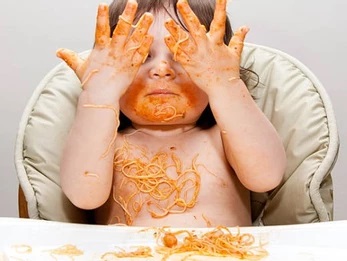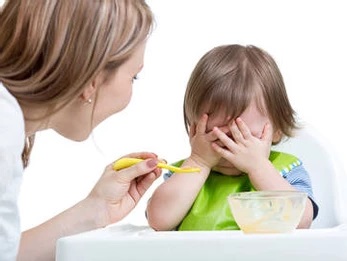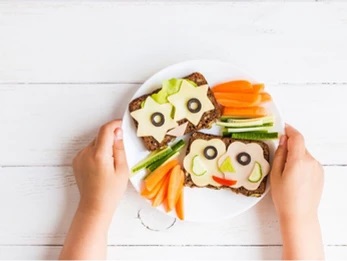By: Stefani Wade, M.S., CCC-SLP
The beginning years of life are critical development years for your child. They are learning all the skills they will need to successfully explore and interact in their environment, specifically the oral motor and feeding skills they will need through adulthood. Many of these skills are developed by ages 2-3 1. Food exploration is a natural part of this development. Children benefit from multiple exposures to new foods when learning to accept food textures2. So, what’s the best way to provide these exposures for your child? Let them be messy!
Benefits of Encouraging Messiness During Meals:
Promotes independence and self-feeding skills
Children learn early to explore their using their hands and by bringing their hands to their mouths. When you encourage your child to use their hands in messy food play, it’s expected that they will eventually bring their hands to their mouths. Sometimes they may miss, dropping foods on themselves and the floor. That’s okay! This play and exploration is providing your child with critical opportunities to taste different flavors and textures.
Facilitates development of oral skills:
When children are given the opportunity to “play” with foods using their hands, they get exposure to how the food will behave when it’s placed in their mouths. If they break a crunchy food with their hands it crumbles. If they break a soft berry with their hands, it’s squishy. Children recognize these responses when their mouths are then exposed to the new food. It will take time for them to learn how to use their tongue, gums, and cheeks together to manipulate all these new foods.
Teaches mealtime pacing and appropriate bite sizes
Children learn through experiences, which often means trial and error. Allowing your child to explore foods at their own pace teaches your child to read their hunger cues. They learn to take appropriate bite sizes that they can manage and how to react when bites are too big. Messy mealtimes facilitate this exploration naturally!
Develops your child’s interest in eating:
Mealtimes should be fun! Your child learns basic skills through play, so why should eating be any different? When a child is given the chance to explore and play during mealtime, mealtimes become another activity that they can look forward to. By encouraging messy food play, you are encouraging happy and healthy mealtime habits.
 Tips:
Tips:
– Have your child eat in their diaper or in clothes that are meant to be messy.
– Place a towel, bed sheet, or blanket on the floor under your child’s highchair for easy cleanup when the mealtime is over.
– Place small handfuls of 2-3 foods on your child’s tray or plate at a time so they can explore different textures and make choices. Refill as your child eats or requests.
– Aim for a 20-30-minute mealtime.
– Eat with your child. They are learning from you! Don’t be afraid to get a little messy yourself to model finger feeding and chewing skills for your child.
References:
1. https://sosapproachtofeeding.com/developmental-milestones-free/
2. Carruth BR, Ziegler PJ, Gordon A, Barr SI. Prevalence of picky eaters among infants and toddlers and their caregivers’ decisions about offering a new food. J Am Diet Assoc. 2004 Jan;104(1 Suppl 1):s57-64. doi: 10.1016/j.jada.2003.10.024. PMID: 14702019.
3. https://www.asha.org/public/speech/swallowing/feeding-and-swallowing-disorders-in-children/



